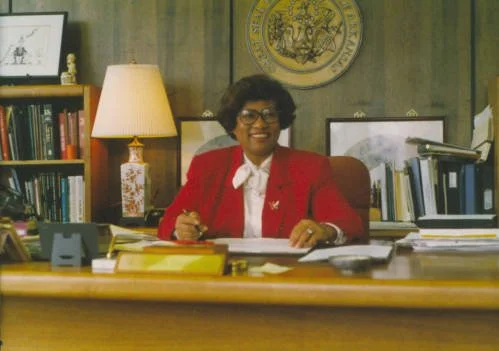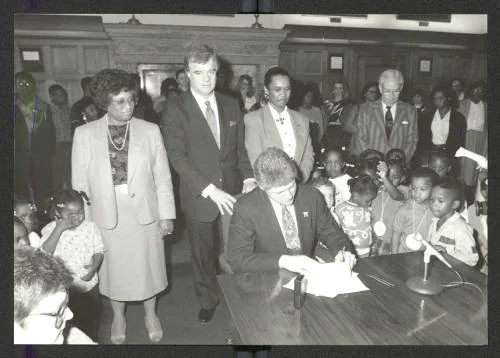Speaking Truth, Saving Lives: Dr. Joycelyn Elders’ Relentless Voice for Public Health
University of Arkansas for Medical Sciences. (2024, March 14). Image by Bryan Clifton Phenomenal Women ceremony at UAMS [Photograph]. UAMS News.
Dr. Joycelyn Elders is renowned for breaking barriers and sparking essential conversations throughout her remarkable career, bringing unprecedented visibility to issues ranging from adolescent health and reproductive rights to substance use prevention and health education. Over the course of decades of clinical practice and research, she has published over a hundred papers, many of which focus on juvenile diabetes and sexual health. TIME Magazine named her “1994 Woman of the Year” and “One of the 100 Most Influential Women of the 20th Century.”
Haller Jones (Elder’s mother) holding her son, Charles Ray next to her daughters Florence and Minnie Joycelyn (then Minnie Lee) Historical Research Center, University of Arkansas for Medical Sciences
Dr. Joycelyn Elders was born in rural Arkansas in 1933, the oldest of eight children. Growing up as the daughter of a sharecropper, as early as five years old, she endured the long days and demanding work of the cotton fields. Taught reading and math by her mother, Elders and her siblings attended the one-room, segregated school 13 miles from their home [2].
During the height of World War II, Elders and her family moved to Richmond, California, drawn by the abundance of job opportunities. Thanks to a placement test, Elders advanced two grade levels and entered an 8th grade class that included both black and white students. Elders quickly realized she could keep pace with - and often stay a step ahead of - her white peers, and with a newfound interest in chemistry that there might be a future for her beyond the cotton fields [3].
Returning to Arkansas two years later, Elders completed high school and subsequently received a scholarship to the all-black liberal arts Philander Smith College in Little Rock. Enjoying biology and chemistry, her sights were set on becoming a lab technician. However, her ambitions changed when she heard a talk by Dr. Edith Irby Jones, the first African American to attend the University of Arkansas Medical School. Elders decided then it was possible for her to become a physician [2].
“I grew up on a farm in a three‑room shack...We didn’t have running water. We didn’t have electricity...No one had health care. There were no health facilities for miles and miles... So, I couldn’t grow up wanting to go into public health, or even wanting to be a doctor, because I’d never even heard of that. You can’t be what you can’t see.” [4]
M. Joycelyn Elders trains five students as chief pediatrics resident at the University of Arkansas for Medical Sciences, c. 1961. Historical Research Center, University of Arkansas for Medical Sciences
She graduated from Philander Smith College with a B.S. degree in biology in 1952. With her sights set on studying medicine, Elders enlisted in the Army’s Women’s Medical Specialist Corps training as a physical therapist. Three years later Dr. Elders enrolled at the University of Arkansas Medical School (UAMS) on the G.I. Bill, attending as only one of three black students. Dr. Elders went on to serve as chief resident, earn her M.D. in 1960, obtain a master’s degree in biochemistry, and become a full professor at UAMS by 1976. Her research focused on endocrinology, and in 1978 she became the first person in Arkansas to receive board certification as a pediatric endocrinologist. [2].
In 1987, Governor Bill Clinton appointed her as Director of the Arkansas Department of Health, charging her with addressing three critical public health issues that mirrored national concerns of the time: AIDS, preventive health care, and teen pregnancy [3].
"Each of us can do something to help children have an opportunity to develop to their full potential. I always say that when you can move from being a sharecropper's daughter to being the director of a health department for the whole state, you didn't get there by giving up." Dr. M. Joycelyn Elders, Director, Arkansas Department of Health. Historical Research Center, University of Arkansas for Medical Sciences
She delivered extraordinary results, nearly doubling childhood immunizations, increasing annual childhood screenings tenfold, establishing a women’s health agenda, creating rape crisis centers, improving family planning counseling, expanding prenatal care, and greatly increasing home-care options for the chronically and terminally ill [3]. Despite these significant strides, she would make headlines for her straight-talking, no-nonsense advocacy for expanding sex education in public schools, establishing school-based health clinics, and advocating for condom use, all with the aim to reduce unintended pregnancies and the spread of HIV/AIDS.
“I was really pushing for sexual health - let's educate young people, let's try and prevent them from getting AIDS, let's teach them we're sexual beings from the day we're born until the day we die. Let's try and teach them how to be sexually healthy. So that's what I spent an awful lot of my time trying to teach young people.” [6]
"To Dr. Elders with thanks, Bill Clinton 3/91"; Received in Director's Office APR 12, 1991. Arkansas Department of Health. Director of the Arkansas Department of Health M. Joycelyn Elders watches as Governor Bill Clinton signs Senate Bill 595 into law. The appropriation bill secured funding for the Arkansas Department of Health and provided revenue for the creation of school clinics focused on reducing the risk of teen pregnancies (late March 1991). Historical Research Center, University of Arkansas for Medical Sciences
She faced a fierce firestorm of criticism from conservatives and some religious groups. Nevertheless, her unwavering lobbying efforts led to a landmark victory in 1989, when the Arkansas Legislature mandated a comprehensive K-12 curriculum including sex education, substance use prevention, and programs to promote self-esteem.
Upon Clinton’s election as President in 1992, he nominated Elders for the position of U.S. Surgeon General. Despite strong opposition from conservatives, she was sworn in in September of 1993, becoming only the second woman, and the first African American Surgeon General in U.S. History. With a personal insight into the challenges of the poorest populations, and as an unwavering advocate for healthcare reform, Elders aptly stated,
“Health is more than an absence of disease; it is about economics, education, environment, empowerment, and community. The health and well-being of the people is critically dependent upon the health system that serves them. It must provide the best possible health with the least disparities and respond equally well to everyone.” [5]
M. Joycelyn Elders at her swearing in as United States Surgeon General. She was sworn in by her brother, Chester Jones, with Oliver Elders standing by her side. Historical Research Center, University of Arkansas for Medical Sciences
As Surgeon General, Elders continued to be an outspoken advocate for the health and well-being of the underserved, voiceless, and overlooked. Her agenda was defined by fearless advocacy for comprehensive sex education in schools, including safe sex practices and contraception, child health, and universal healthcare. She continued to emphasize the need for employing new tactics to address the nation’s pressing health problems. Her efforts provoked intense scrutiny, but ultimately shifted the national conversation.
“We as old folk have been the most dishonest. We've been silent and our silence has been deafening. It's cost our young people their lives in terms of disease, it's cost young women in terms of [being] poor [and] ignorant...we need to educate them. I want you to have as much sex as you want but I want you to have healthy sex.”[6]
With authentic compassion, Elders embodied the unflinching directness needed to drive change, resisting pressure to soften her message for political gain. However, the controversies surrounding these hot-button issues eventually reached a breaking point, and in 1994 President Clinton asked Dr. Elders to resign as Surgeon General.
After leaving office, she continued to educate, mentor, and advocate for health equity as a Professor of Pediatric Endocrinology at the University of Arkansas Medical School, and later as Professor Emerita at the University of Arkansas, who honored her legacy by establishing the M. Joycelyn Elders, M.D. Chair in Health Promotion and Disease Prevention [7]. In 2014, the Institute for Sexual and Gender Health at the University of Minnesota established the Joycelyn Elders Chair in Sexual Health Education which works to create comprehensive life-long sexual education curricula, increase the number of health care providers trained in sexual health care, and expand scientific research in sexuality education [8]. Dr. Elders would go on to receive numerous awards and honorary degrees, a testament to the lasting legacy of her compassionate crusade to educate and equip the youth of our country to make healthy sexual choices. [3].
With the 2025 Alma Dea Morani MD Renaissance Woman Award, we celebrate the groundbreaking courage and steadfast dedication of Dr. Joycelyn Elders. Rising above the barriers of her time, Dr. Elders transformed challenges into a platform for advocacy, championing those whose voices were too often ignored. Her fearless leadership in Arkansas and Washington not only redefined the possibilities for change but also shifted the national conversation, boldly challenging outdated norms to advance health and equity for all.
The Foundation will present the Alma Dea Morani, MD Renaissance Woman Award to Dr. Elders this fall at a free virtual event on Thursday, November 6, 2025, at 4:00 pm ET.
We cordially invite you to join us as we celebrate the extraordinary accomplishments of Dr. Joycelyn Elders—physician, researcher, teacher, and champion for the dignity and health of all people.
About the Alma Dea Morani, MD Renaissance Woman Award
The Alma Dea Morani Award is our most prestigious form of recognition, given to a woman who has left a significant mark on history and pivotally advanced the future. Our community of awardees is second to none, with achievements that often break entirely new ground. We are proud to name the discovery of the breast cancer gene, the appointment of the first woman president of the American Psychiatric Association, and the founding of the Program in Narrative Medicine at Columbia among the many milestones our awardees have attained.
Resources and for Further Reading:
Elders, J., & Chanoff, D. (1996). From sharecropper’s daughter to surgeon general of the United States of America: The education of Joycelyn Elders, M.D. New York: William Morrow.
National Library of Medicine. (2024, October). Changing the Face of Medicine - Dr. M. Joycelyn Elders [Video]. YouTube. https://www.youtube.com/watch?v=1kmGWcj_laA
Arkansas PBS. (2023, September) Men and Women of Distinction: Dr. Joycelyn Elders [Video] YouTube. https://www.youtube.com/watch?v=5VXOZDitnHw
Joycelyn Elders. (2025, February 4). Wikiquote. Retrieved July 28, 2025, from https://en.wikiquote.org/w/index.php?title=Joycelyn_Elders&oldid=3660003.
Elders, J. (n.d.). Joycelyn Elders quotes. AZQuotes. Retrieved August 4, 2025, from https://www.azquotes.com/author/23935-Joycelyn_Elders
Democrat-Gazette. (2024). An interview with former Surgeon General of the U.S., Dr. Joycelyn Elders [Video]. YouTube. https://www.youtube.com/watch?v=dTI4vTBVefc
Waldrum, B. (2017, April 21). James M. Raczynski, Ph.D., named to inaugural M. Joycelyn Elders, M.D., chair in health promotion and disease prevention. UAMS News. Retrieved September 9, 2025, from https://news.uams.edu/2017/04/21/james-m-raczynski-ph-d-named-to-inaugural-m-joycelyn-elders-m-d-chair-in-health-promotion-and-disease-prevention/
University of Minnesota Medical School. (2025, September 5). Joycelyn Elders Chair in Sexual Health Education. Eli Coleman Institute for Sexual and Gender Health. Retrieved September 9, 2025, from https://med.umn.edu/sexualhealth/about/joycelyn-elders-chair-sexual-health-education
Watson, S. (2015, April 9). UAMS unveils portrait, launches endowment campaign honoring former U.S. Surgeon General M. Joycelyn Elders. University of Arkansas for Medical Sciences. https://news.uams.edu/2015/04/09/uams-unveils-portrait-launches-endowment-campaign-honoring-former-u-s-surgeon-general-m-joycelyn-elders/
All pictures courtesy of: University of Arkansas Libraries. (n.d.). Making a Difference: The M. Joycelyn Elders, M.D. Collection, https://cdm17317.contentdm.oclc.org/digital/collection/p17317coll2






